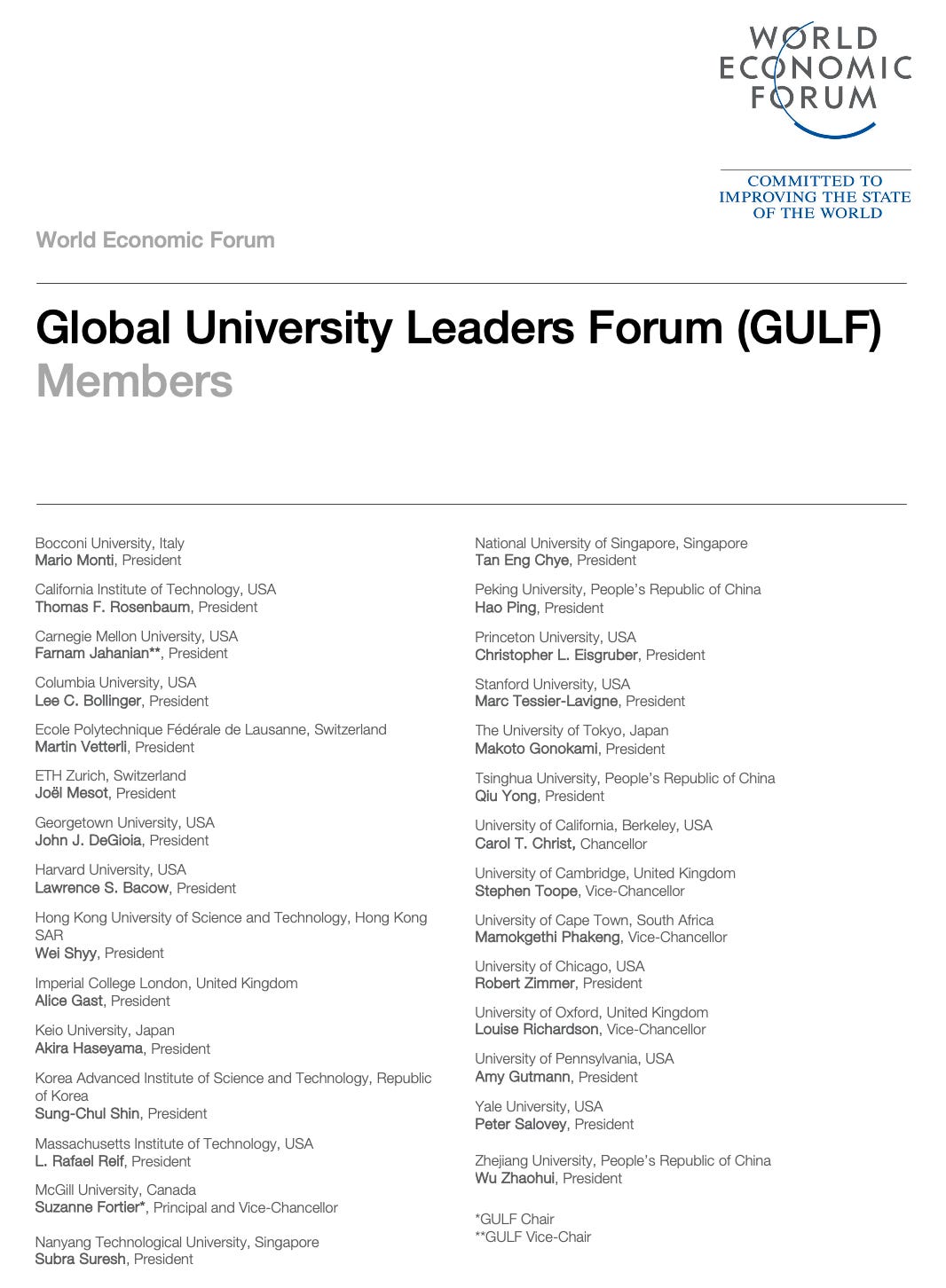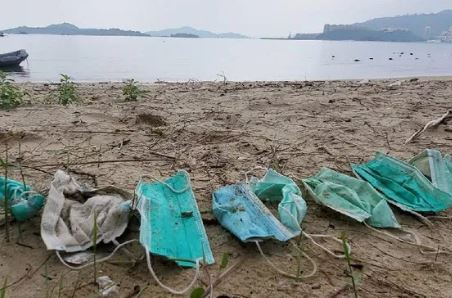 Parler
Parler Gab
Gab
The Global University Leaders Forum (GULF) community consists of the presidents of the world’s leading universities who are committed to supporting the Forum’s mission of improving the state of the world. Together GULF presidents identify and address matters of common interest, including trends, challenges and best practices in higher education, research and societal impact. The community is comprised of 29 members and is chaired by Suzanne Fortier, Principal and Vice-Chancellor, McGill University. In 2021, the GULF community will focus on how universities can facilitate a more equal and inclusive recovery from the COVID-19 pandemic, including through exploring the skills for the future and reskilling, social inclusion, and climate action. GULF presidents and faculty engage in multiple ways with the Forum:The 29 members of GULF are listed below:
- Expert networks: opportunities for experts to contribute to expert communities including the Global Future Councils
- Insight development: opportunities to contribute to new research, disseminate new insights and collaborate on enhancing Strategic Intelligence
- Action: opportunities to shape the world through 18 platforms addressing social, environmental, technological and industry challenges
- Learning: opportunities to develop and pilot educational modules with Forum communities

The World Economic Forum’s network of Global Future Councils is the world’s foremost multistakeholder and interdisciplinary knowledge network dedicated to promoting innovative thinking to shape a more resilient, inclusive and sustainable future. The network convenes around 600 of the most relevant and knowledgeable thought leaders from academia, government, international organizations, business, and civil society, grouped in expertise-based thematic councils. It is an invitation-only community and members are nominated for a two-year term.It seems to me that the Global University Leaders Forum is yet another way that the WEF has co-opted world leaders. These are doing the work of the WEF in ways we can only imagine. People often remark that the WEF holds no positions of great authority, that is full of pomp and circumstance, but no substance. Nothing could be further from the truth. Remember in 2019, when the WEF and the United Nations signed a massive partnership agreement? Now, the power of the WEF is backed up the power of the UN and vice-versa. The following is from a WEF press release, published on June 13, 2019:
The World Economic Forum and the United Nations signed today a Strategic Partnership Framework outlining areas of cooperation to deepen institutional engagement and jointly accelerate the implementation of the 2030 Agenda for Sustainable Development. The framework was drafted based on a mapping of existing collaboration between the two institutions and will enable a more strategic and coordinated approach towards delivering impact.The United Nations no longer represents nations, it is a partner with the 1000 largest transnational corporations in the world: the WEF. We can only assume that with this partnership a massive amount of money flowed into the coffers of the United Nations. The United Nations and the World Economic Forum do not have officials which represent the people. Their leaders have not been elected to make decisions on our behalf or on our nation’s behalf. The agendas of these organization are not those of our nation and do not reflect our concepts of rights to personal sovereignty. Yet through vessels such as Agenda 2030 and the World Health Organization’s (a UN umbrella organization) proposed International Health Regulations, there is the appearance that the UN wishes to supersede national law and both national and personal sovereignty. Those politicians with affiliations to the WEF need to declare themselves as foreign agents. It is an inherent conflict of interest to both represent and support the WEF and the U.S. government. Likewise, many of the university presidents named as WEF GULF leaders are from public institutions. They have a duty, as public officials, to report this as a conflict of interest with their institution. Taxpayer money should not be supporting university presidents who have fealty to a foreign NGO. Read more at: LifeSiteNews.com
Russia arrests WSJ reporter over ALLEGED espionage charges
By Ramon Tomey // Share
Italy bans ChatGPT over PRIVACY concerns
By Ramon Tomey // Share
Biden White House sought to censor private WhatsApp messages questioning vaccine safety
By Ethan Huff // Share
The 10 WORST aftereffects of the PLANDEMIC
By S.D. Wells // Share
Governments continue to obscure COVID-19 vaccine data amid rising concerns over excess deaths
By patricklewis // Share
Tech giant Microsoft backs EXTINCTION with its support of carbon capture programs
By ramontomeydw // Share
Germany to resume arms exports to Israel despite repeated ceasefire violations
By isabelle // Share










